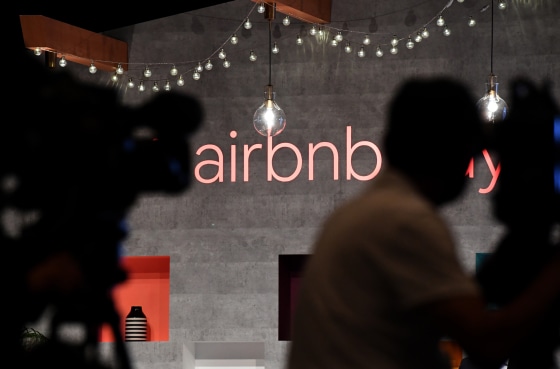Airbnb's eagerly anticipated debut IPO on Thursday caps a record year for private companies going public, amid a red-hot stock market that has barreled through a series of all-time highs.
There have been 129 initial public offerings this year, compared to 110 in 2019, according to PitchBook, a financial software and data service, for an estimated total of $252 billion.
“It’s surprising. If we had talked in April or May of this year I would not have predicted what we have seen throughout the following six months,” Cameron Stanfill, an analyst at PitchBook, told NBC News. “A lot of it is due to the strength in the broader stock market since April. When that started coming back positively and stimulus passed, investors gained confidence. As that gained momentum, we saw a lot of technology companies choose to go forward with their IPOs.”
While the spring lockdowns had millions of people turning to delivery services such as DoorDash, Airbnb faced initial difficulties. The travel company laid off 25 percent of its global workforce and slashed executive salaries. But, months into the pandemic, Airbnb pivoted to marketing close-to-home stays and was able to get its business back on track, despite an ongoing slump in the travel industry.
"Since the pandemic began, the percentage of bookings made on Airbnb within 200 miles, a round trip travelers can generally complete on one tank of gas, has grown from one-third of all bookings in February to over half in May,” the company said in a June blog post.
That resiliency was rewarded on Thursday when Airbnb listed its stock at around $68 per share, for a valuation of $47 billion. DoorDash shares were sold at $102 at the start of trading on Wednesday. The stock closed at $189.51 after the first day of trading, marking an increase of 85.79 percent — and minting three brand-new billionaires, three of the company's co-founders.
Outside of DoorDash and Airbnb, the top 25 IPOs of the year were dominated by software companies. Snowflake, Unity, Palantir and security company McAfee were among the companies with the biggest IPOs this year, ranging in price from $30 billion (Snowflake) to $8 billion (Palantir). Warner Music Group, the label behind Ed Sheeran, Cardi B and other best-selling artists, went public in May at a valuation of $13 billion.
Supermarket chain Albertsons was the largest retail IPO of the year, while several pharmaceutical and IT service stocks rounded out some of the biggest public debuts of the year, according to data compiled by PitchBook.
While the pandemic initially prompted some companies to re-evaluate their plans for going public, overall Stanfill said there “haven’t been any broad negative outcomes” and that “as a whole, the (2020) group has priced fairly attractively.”
“You’re seeing sectors that bowed out, like Airbnb, coming back,” he said. “They were one of the hardest hit.
While 2020 was unpredictable, the trend for hot IPOs should hold through the first half of 2021, Stanfill said, noting that it will be interesting to see if companies that were “boosted by the pandemic" continue to perform well after much of the population has been inoculated with the Covid-19 vaccine.
“I still see some data and valuations to remain strong through the first half of the year. There are enough large companies in the pipeline that are planning to list, notably Stripe and Robinhood,” he said. “That will drive a lot of value and kick start anything that is going on in 2021.”
